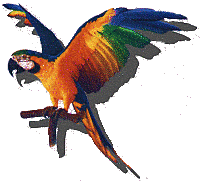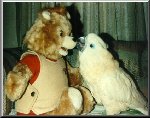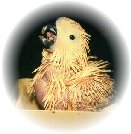| |
BIRDS AS PETS |
 |
Through the ages, birds have amused and enchanted their owners with their intelligence and ability to mimic the human voice ever so clearly. Only in recent years have they become such a popular pet - almost currently rivaling the number of cat households. There is a special bond that is developed with a bird that is stronger than that of a dog or cat. Perhaps it's because of their ability to talk, or perhaps it's because they seem to own you - demanding time with you when they want it. It may also be that they are one of the longest lived creatures on earth. |
Not everyone should own a bird. There are many considerations to make before committing yourself to purchasing a pet that may outlive you. Most birds are like 3 year olds who never grow up. Do you have the patience for that? The better of the
talking species also have a tendency to scream or pick up nasty vocal habits for attention. Can you live with that forever - or can your neighbors?
Some species are unpredictable and may give a good bite when you would least expect them to. Most become irritable when moulting and some
get very nasty when they become sexually mature and are "in season". They cannot be reprimanded like a dog or cat at these times and taught not to bite. They should NEVER EVER be hit or struck in any way. If you can't laugh all the way to the bandaid box when the unexpected happens, don't buy a bird. Some birds may never bite if shown only love and kindness and never teased, neglected or mistreated. Much also depends upon the species as to their temperament. I am also of the opinion that, like any other animal, there are good and bad qualities inherited from their parents. |

 |
In addition to their beautiful colors, intelligence, mimicry and bonding, birds add color and life to a home and are conversation pieces outside the home. They can travel with you most anywhere. The responsiveness of a bird to its owner is apparent in the strobelike dilating of an Amazon's eyes, the cuddliness of a Cockatoo, the whistling and sweetness of a Cockatiel, the willingness of a Macaw to play ball with you or to roll over on its back in your arms, the soft flutter of a Budgie's wings before it lands on your head, and the playfulness and affection of a Conure. |
 |
| Although some older birds who need to be placed in a new home can make wonderful pets, a new bird owner should look for a just weaned baby bird and buy from a breeder or pet store who will educate you properly on the special needs and how-tos of the care of the species you choose. They should also be willing to answer questions for you after you take the bird home. For a first time bird owner, there will be many. Although some will advise you to only buy from breeders who allow you into their aviary, the opposite is true. Years ago, I allowed everyone in, but that was not a wise move. These days it is even more dire to allow someone into the aviary for many reasons: liability, introduction of disease, would-be thieves casing the place, etc. Most breeders have a separate place on their premises where you can view the babies. The rest are very leery of doing this and will arrange for delivery of the baby to you. Asking for references is your best bet if you haven't already been referred. |
 |
 |
One plus about the upkeep of a bird is that it may never need veterinary care*. Buying a healthy bird from a trusted breeder or pet shop who will give you a health warranty should assure you of sharing many years together without the expense of veterinary health maintenance since birds don't need vaccinations or routine checkups. The proper diet, the right type and size cage and outside perch, enough exercise, a clean environment (no hidden mold, chemicals, smoke, air fresheners, lead wick candles, etc.), and alot of attention is plenty of assurance that you'll have many years together. Read our extensive list of bird tips for things you may have never thought of.
*An initial veterinary exam might give you reassurance that there is nothing wrong with the bird and also establish a relationship and account with a vet in case of emergency. I'm not a big advocate of taking a healthy bird to a vet due to the fact that you may needlessly expose your bird to disease lurking in the vet's office. There is much controversy about this subject, so I'd advise you to use your best judgment here. Annual or routine exams are not needed unless you suspect that there is something wrong with the bird or it becomes injured in some way. In that case, do NOT hesitate to see a vet.
There is one big however, though. If for some reason (accident, environment, etc.) you do have to see a vet, be sure that you have the financial means to do so. If a bird breaks a bone somehow, you will have office visit, x-ray, and possibly other fees that may exceed $200. Even if you buy a bird for $45, you must be able to provide it humanely with whatever unexpected care that it needs. |
| PARROT TRIVIA: Bird Brained
From the Radio Program "Creation Moments"
Ecclesiastes 10:20
"Do not curse the king, even in your thought; do not curse the rich, even in your bedroom; for a bird of the air may carry your voice, and a bird in flight may tell the matter."
Mankind has been teaching birds to talk for thousands of years. Man has also been using birds to deliver messages for just as long. But new research on the intelligence of birds suggests that they might be more intelligent than we suspect.
Researchers studying pigeons have learned that they can read all of the letters of the alphabet and they read them in a way similar to people. Scientists became convinced that pigeons see the world in much the same way as we do when they discovered that pigeons tend to confuse the very same letters that people do. What's more, it took only four months for pigeons to learn to distinguish all the letters of the alphabet. For years pigeons have been used to spot and reject defective items on assembly lines, where they have better records than human beings.
Based on evolutionary theory, scientists naturally conclude that the recognition of abstract forms such as letters of the alphabet requires the larger brain. But this is an assumption and we might be reminded of the work of Harvard psychologist B. F. Skinner who made extensive use of learned behavior using pigeons. Brain size has little to do with intelligence. Real science and experience show this and disprove evolutionary views. The only alternative is that it is the Creator who gives His creatures their intelligence.
Prayer: Dear wise heavenly Father, I thank You that You have so generously provided intelligence to the animals, not only that they can make their livings, but also so they can serve man and help us. In Jesus' Name. Amen.
For more "Creation Moments" transcripts or audio files, go to the archives of "Creation Moments" |
| | |











